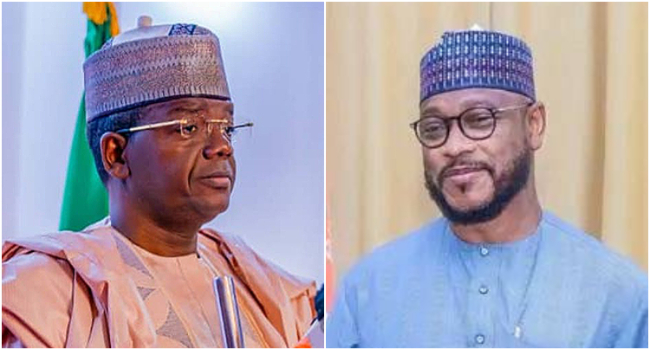The political landscape of Zamfara State is currently witnessing a tug-of-war between the ruling Peoples Democratic Party (PDP) and the opposition All Progressives Congress (APC), centered around Governor Dauda Lawal’s party affiliation. Lawal, the fifth civilian governor of the state, was elected under the PDP banner. However, former governor and current Minister of State for Defence, Bello Matawalle, who himself transitioned from the PDP to the APC, has publicly urged Lawal to follow suit and join the ruling party at the national level. This invitation has sparked a wave of speculation and rumors within the state, prompting Lawal’s administration to firmly reiterate his commitment to remaining within the PDP.
Governor Lawal, through his spokesperson, Mustafa Kaura, has categorically denied any intentions of defecting to the APC. Kaura emphasized that Lawal remains steadfast in his loyalty to the PDP, the party that provided him with the platform to contest and win the 2023 governorship election. He dismissed the rumors as baseless and urged PDP supporters to disregard such claims. Kaura’s statement underscored Lawal’s belief in divine destiny, suggesting that whatever God has planned for him will come to pass, irrespective of his party affiliation. This statement, while reaffirming his commitment to the PDP, also subtly hints at the underlying political pressures and maneuvering that might be influencing the situation. It suggests that Lawal’s decision is not merely a political calculation but also a matter of personal conviction.
Matawalle’s public call for Lawal to join the APC came during a Sallah homage at his residence in Maradun. He urged Lawal to abandon the alleged “hide-and-seek game” and openly embrace the APC, framing the move as a step towards the overall progress and development of Zamfara State. Matawalle extended an olive branch, assuring Lawal of a warm welcome within the APC and emphasizing that he harbors no ill will towards the governor. He portrayed the APC as a progressive force working for security, development, peace, and tranquility, implicitly contrasting it with the PDP’s perceived shortcomings in these areas. Matawalle further urged Lawal to justify the substantial federal allocations received by the state by implementing tangible development projects and improving basic infrastructure.
The former governor also leveraged the occasion to praise President Bola Tinubu’s leadership, describing him as a progressive figure committed to the nation’s development. He presented Tinubu’s administration as a welcoming space for all those who wish to contribute to peace, harmony, growth, and development. This praise of Tinubu serves a dual purpose: it reinforces Matawalle’s own alignment with the ruling party and implicitly presents the APC as the best path forward for Zamfara State. By connecting Lawal’s potential defection with Tinubu’s national agenda, Matawalle attempts to frame the decision as not just beneficial to Zamfara but also aligned with the broader direction of the country.
Matawalle highlighted the recent successes in combating terrorism, attributing them to the collaborative efforts of the Ministry of Defence and security agencies. He referenced the elimination of several terrorist kingpins and foot soldiers as evidence of the administration’s commitment to security. This emphasis on security achievements serves to bolster the APC’s image as the party best equipped to address Zamfara’s security challenges, a critical issue in the state. By drawing attention to these achievements, Matawalle indirectly implies that Lawal would be better positioned to address these issues within the framework of the ruling APC, especially given his, Matawalle’s, own position within the Ministry of Defence.
In summary, the political dynamics in Zamfara State revolve around Governor Lawal’s party affiliation. While Matawalle actively courts him to join the APC, emphasizing the party’s progressive agenda and commitment to development and security, Lawal remains firmly rooted in the PDP. This back-and-forth highlights the ongoing power struggle between the two parties in the state and raises questions about the future political landscape of Zamfara. While Lawal’s commitment to the PDP appears unwavering, Matawalle’s persistent overtures suggest that the tug-of-war is far from over. The situation is further complicated by the significant federal allocations received by the state, which both sides use as a bargaining chip, one to justify the need for effective governance and the other to highlight the potential benefits of aligning with the ruling party at the national level.


